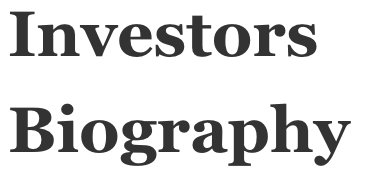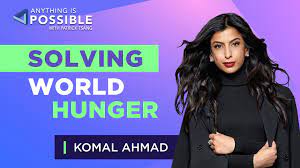Komal Ahmad was on her way to becoming a doctor when a chance encounter with a hungry, unhoused veteran changed her life. She founded Copia, an organization responsible for connecting nonprofits with more than 6.5 million pounds of potential food waste. She is also a winner of the Nelson Mandela Humanitarian Award and has appeared twice on Forbes’ 30 Under 30 list.
Early Life
Ahmad was born in Lahore, Pakistan, in 1989. She grew up in Las Vegas, where her parents moved when Ahmad was very young.
Ahmad’s mother became a nurse after immigrating to the United States, and around the age of 2, Ahmad decided she wanted to become a doctor. Knowing she also wanted to serve the country that had given her family so much, she decided to pursue a career as a naval doctor.
After graduating second in her class from Palo Verde High School, Ahmad attended the University of California, Berkeley, where she joined the NROTC (Naval Reserve Officers Training Corps) program. An honors student who majored in international health and global development as well as in global poverty and practice, Ahmad served as a medical volunteer in developing countries during her summer breaks.
Food Insecurity
During her senior year at UC Berkeley, Ahmad crossed paths with a young military veteran named John while walking home. John had recently returned from his second tour in Iraq. He had no family and had been waiting weeks for his military benefits to start coming in. It had been three days since he had eaten.
Realizing it was possible that John’s story could one day be her own, Ahmad bought him lunch. The experience left her questioning why someone like John could be starving when, only a few steps away, UC Berkeley’s dining hall was throwing away inordinate amounts of food every day.
Inspired to help people like John, Ahmad spoke to the dining hall manager, who said that liability issues were forcing him and his staff to dispose of the food instead of donating it. She did some research and, a few days later, came across the Bill Emerson Good Samaritan Act, a 1996 law that largely protects food donors from liability issues.
She showed the law to the manager, and after only a seven-minute conversation, he agreed to work with Ahmad. The next day the manager called Ahmad to tell her that he had 500 sandwiches that were about to be thrown away. She picked them up, but after several local nonprofits didn’t answer her calls, she frustratingly was able to donate only 15 of them. The experience made her think that there had to be a better way to divert surplus food to people going hungry.
Taking Action
Ahmad spent her final year at UC Berkeley working to do just that. Along with serving as a board member of the Oakland Food Policy Council, she established the student organization BareAbundance.
As CEO, she guided BareAbundance in redistributing food to people in need. In contrast to her experiences volunteering overseas, where she realized that while she was providing medical care to her patients, she wasn’t addressing the underlying issues causing their problems, she took charge of BareAbundance’s efforts to offer nutrition instruction to the people it served.
BareAbundance later became a 501(c)(3) and changed its name to Feeding Forward. The nonprofit, which Ahmad continued to lead after graduating from UC Berkeley in 2012, won several awards, including Outstanding Commitment to Action from the Clinton Global Initiative.
Copia
While Ahmad remained committed to solving the issues of food insecurity and food waste, she eventually grew frustrated with the strictures of running a nonprofit. In 2015, after a short stint working at Google, she founded the for-profit public benefit corporation Copia.
Using the corporation’s app and online platform, companies notify Copia when they have excess food available. Copia then assigns a “Food Hero” driver to pick up the donation and, using real-time data, deliver it to the nonprofit that’s best positioned to distribute it. Partner companies receive tax breaks, and nonprofits have the resources to better achieve their mission.
Copia graduated from the Y Combinator startup accelerator in 2016, joining a prestigious group of alumni that includes Reddit and Beek. By 2017, the company had successfully fed close to 700,000 people. Notably, during the weekend of Super Bowl 50, Copia’s endeavors prevented over 28,000 pounds of potential food waste and provided meals for nearly 23,000 individuals across the San Francisco Bay Area.
In recognition of her leadership of Copia, Ahmad was named a Tech Industry Rising Star by Business Insider and twice appeared on Forbes’s 30 Under 30 list. In 2016, she won the Toyota Mother of Invention award. The following year, she won the prestigious Nelson Mandela Humanitarian Award.
Ongoing Work
As of 2023, Copia has recovered more than 6.5 million pounds of food and delivered 5.4 million meals. As Ahmad points out, through partnerships with entities like Bloomberg, the Cheesecake Factory, and the Arizona Cardinals, much of the food Copia collects is high quality and even gourmet level.
In the process of collecting and donating food, Copia has also helped to divert nearly 30 million pounds of cardon dioxide that would have been created had the unconsumed food reached a landfill. The company, which CEO Kimberly Trouville Smith now leads, has recently rolled out tools to help partner companies calculate the environmental impact of their donations in addition to their tax savings.
In September 2023, Ahmad announced Copia had received a new round of funding that would help it continue its work. The same month, she delivered a presentation, “The Power of Purpose-Driven Leadership,” at the South Asia E-Commerce Summit.

